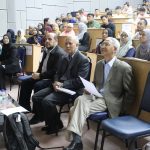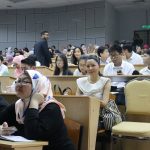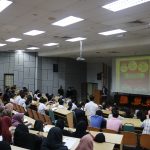By Azanis Shahila
GOMBAK, 7 April 2018: The much debated topic surrounding fake news and the recent enactment of a legislation to address the issues raised, subsequently its impact on freedom of information and expression, was featured in a forum “Socio, Legal, and Political Landscape: Media Literacy and Fake News” held at IIUM yesterday (6 April).
Organised by the Department of Communication, IIUM in collaboration with IIUMToday, the forum examined a range of issues significantly raised including from the legal perspective, and the social and political implications, including the Islamic perspective.
On the panel were Dr. Nik Salida Suhaila Nik Saleh, Commissioner of the Human Rights Commission of Malaysia (SUHAKAM), Prof. Dr. Ezhar Tamam of Faculty of Modern Language and Communication, Universiti Putra Malaysia (UPM), and Assoc. Prof. Dr. Radwan Jamal Yousef Elatrash, Head of Department of Quran and Sunnah, KIRKHS.
The forum was moderated by Prof. Dato’ Sri Dr. Syed Arabi Idid, a senior communication professor and former IIUM Rector.
Legal perspective
Dr. Nik Salida Suhaila, in her presentation, outlined the ways that fake news could be addressed, including civil actions for defamatory cases that caused damage to a persons reputation, and criminal actions that affect a community, and a threat to national security, within the existing laws provided for under the Federal Constitution.
She said, œAs media attention and public condemnation of fake news continues to intensify, we must have enough knowledge to use our freedom of speech and association to refrain ourselves from spreading fake news.”
She added that the Anti-Fake News Bill 2018Â recently passed by the Parliament, is aimed at protecting the public from fake news and freedom of speech as provided for under the Federal Constitution.
The bill provides that any person who, by any means, creates, offers, publishes, prints, distributes, circulates or disseminates any fake news or publication containing fake news, is liable to punishment.
Therefore, she reminded the audience to be aware of issues of fake news and how the laws operate so that “you do not simply share any unclear or unverified information or else you would be charged a maximum fine of RM500,000, an imprisonment not exceeding 6 years, or both, upon conviction, for maliciously creating or spreading fake news.”
Media literacy and its importance
Meanwhile, Prof. Ezhar in his presentation, stressed the importance of media literacy so that the audience will be able to look at the news or information disseminated with critical eyes and will not be easily influenced.
Referring to the Bill on Anti-Fake News 2018, Prof. Ezhar felt that it would not be effective just through legislation alone to curb the spread of fake news.
He explained that since the definition of fake news is vague “media literacy plays an important role to address the issues of fake news.”
The highlight of his presentation was the introduction of the Media Literacy Malaysia Massive Open On-line Course (MOOC).
Prof. Ezhar told the audiences that the course explains the concept of media reception, how media content is created, the meaning of freedom of expression, and the ethical and cultural values in responsible communication, and media use.
“This course is very important to promote awareness of societal reasonability on the social and cultural usage of media. With the practice of media literacy, people will be more aware of their role and will know to differentiate between true and fake news.”
Islamic perspective
Assoc. Prof. Dr. Radwan highlighted the views on fake news based on Islamic perspective quoting certain verses from the Quran to support his argument.
He mentioned surah Al Ahzab verses 70 about the importance of being truthful and to always speak the truth.
He said, œ Those who spread the unverified news on social media deserve to be labeled slanderers and liars.
œIn Islam, it is a sin to spread unverified information and gossip. It is also a sin for you to receive and read news on social media that is unverified. News and sources of the news should be verified first,” he added.
“If a person commits a murder, it only involves the life of one person. But when he or she commits slander, his or her action could affect many people “ even an entire society.”
œTherefore, it is a priority in Islam to take care of other people’s welfare, because if slander spreads, it could have a negative impact on society,” Dr. Radwan added.
Social awareness
In a nutshell, the speakers who shared their thoughts on the issues agreed that both the laws and creating awareness are important in addressing the issues on fake news.
In concluding the forum, Prof. Dato Sri Dr. Syed Arabi Idid said: œWe have to understand that although there are relevant laws, until today, the rapid media convergence and complex development of communication technology mean the problem still cannot be managed effectively. Therefore, social awareness and media literacy are very important in addressing the issues of fake news. ***



